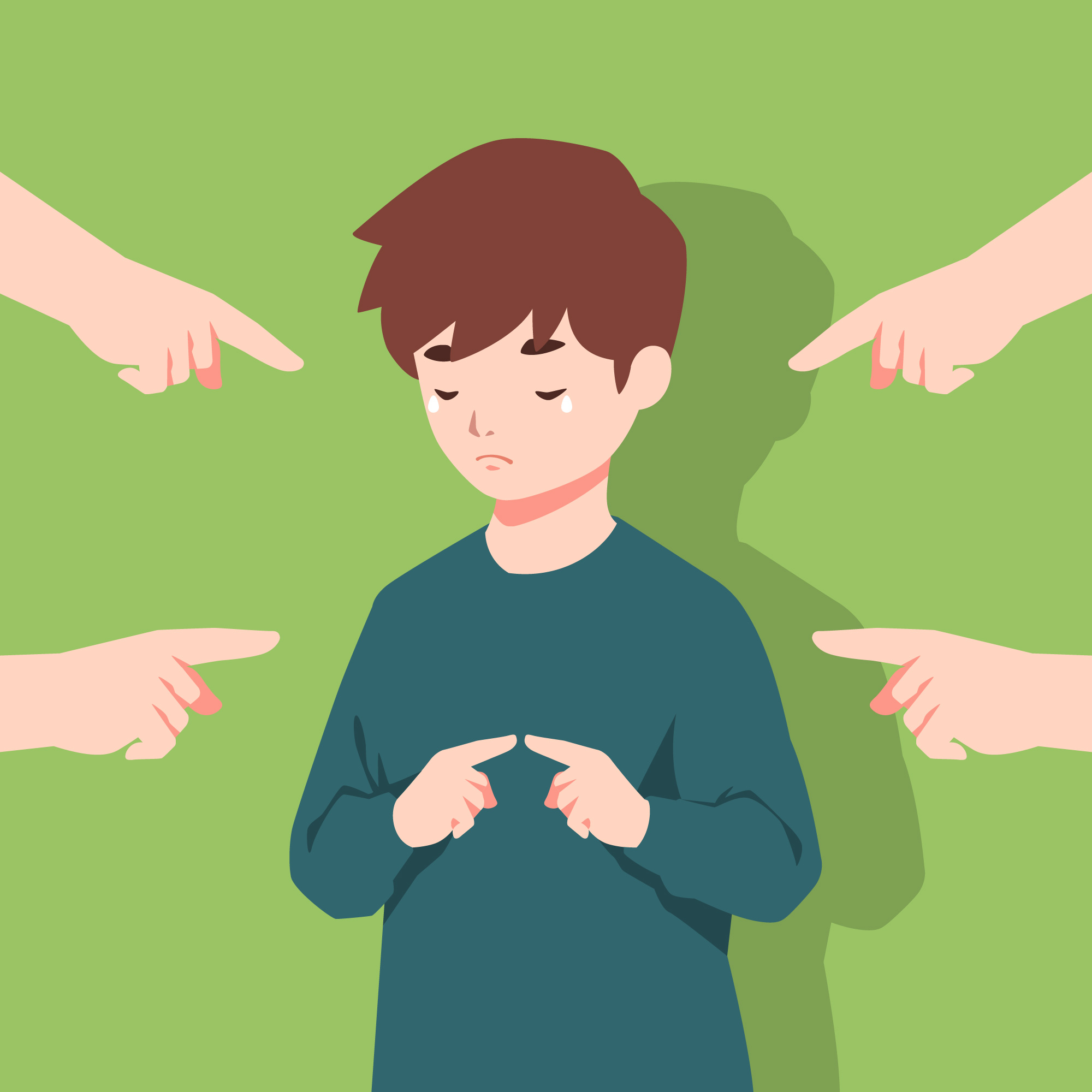Embarrassment is typically a temporary emotion caused by a minor mistake or social faux pas. Humiliation is more severe and can be caused by public shaming or bullying.
Embarrassment
(Image by cookie_studio on Freepik)

Embarrassment is a natural human emotion that we all experience at some point in our lives. It’s the feeling of being self-conscious or ashamed, usually as a result of something you’ve said or done. Embarrassment can be triggered by anything from making a mistake in public to having an unexpected bodily function occur in an inappropriate setting.
One interesting fact about embarrassment is that it often leads to blushing. When we’re embarrassed, our bodies release adrenaline which causes blood vessels to dilate and increase blood flow to the face, resulting in redness.
While embarrassment can be uncomfortable and even embarrassing (pun intended) at times, it’s important to remember that it’s just a temporary feeling. Most people are understanding when someone else makes a mistake or has an awkward moment – after all, we’re all human! If you find yourself experiencing embarrassment frequently or feel like your life is being negatively impacted by these feelings, consider seeking help from a mental health professional who can provide support and guidance on how to manage them effectively.
Humiliation
(Photo By Freepik)

Humiliation is a complex emotion that can stem from various sources. It can be the result of public speaking, social rejection, or even being reprimanded by a superior at work. The feeling of humiliation goes beyond embarrassment and involves a deep sense of shame and inadequacy.
The experience of humiliation can lead to significant psychological distress, such as depression and low self-esteem. People who feel humiliated may begin to doubt themselves and their abilities, leading to feelings of worthlessness.
One common reaction to experiencing humiliation is anger. When someone feels powerless in a situation where they have been humiliated, they may lash out in an attempt to regain control. This can sometimes lead to further negative consequences, including damaging relationships with others.
It’s important for individuals who have experienced humiliation to seek support from trusted friends or professionals. Talking about the experience openly with someone who will listen without judgment can help alleviate some of the pain associated with this difficult emotion.
While overcoming feelings of humiliation can be challenging, it is not impossible. With time and effort focused on building confidence in oneself again – whether through therapy or other means – it’s possible for people who have experienced humiliation in the past to move forward and find success once more.
Embarrassment Vs. Humiliation – Key differences
Embarrassment and humiliation are two emotions that can be easily confused with one another. While they may share certain similarities, there are key differences between the two.
Embarrassment is a feeling of self-consciousness or awkwardness in response to an embarrassing situation. It’s a mild form of distress that is often short-lived and temporary. Examples of embarrassment include tripping over your own feet in public or accidentally spilling something on yourself in front of others.
On the other hand, humiliation is a deeper emotional wound that results from being exposed to shame or ridicule. It’s a more severe form of distress that can have long-lasting effects on an individual’s self-esteem and confidence. Examples of humiliation include being publicly criticized by your boss or getting laughed at by a group of people for making a mistake.
The key difference between embarrassment and humiliation lies in their intensity and duration. Embarrassment is usually brief and doesn’t leave any lasting damage, while humiliation can be long-lasting and have serious consequences for an individual’s mental health.
It’s important to understand the differences between these two emotions so you can recognize them when they occur and respond appropriately. By doing so, you’ll be better equipped to deal with them in healthy ways rather than allowing them to control your life negatively.
How to deal with embarrassment?
Embarrassment is a common emotion that everyone experiences at some point in their lives. It can arise from various situations, such as tripping over in public or getting caught doing something embarrassing. While it may feel unbearable at the moment, there are ways to deal with embarrassment effectively.
The first step in dealing with embarrassment is acknowledging and accepting your feelings. Suppressing or denying them will only make you feel worse. Allow yourself to feel embarrassed, but don’t let it consume you completely.
Try to put things into perspective by reminding yourself that embarrassing moments happen to everyone. You are not alone in feeling this way. Laugh about the situation if appropriate, and move on from it.
It’s important not to dwell on the incident too much and avoid replaying it repeatedly in your mind. This will only prolong your negative emotions and hinder your ability to move on from the experience.
Another effective way of dealing with embarrassment is talking about it with someone you trust – a friend or family member who won’t judge you for what happened but instead offer support and comfort during this time.
Remember that no one else remembers these moments as vividly as we do ourselves- people go through their own struggles every day!
How to deal with humiliation?
Humiliation can be an incredibly difficult emotion to deal with, as it often involves feeling completely exposed and powerless. However, there are some strategies that you can use to help you cope with feelings of humiliation.
One approach is to take a step back from the situation and try to gain some perspective on what happened. This might involve talking things through with a trusted friend or therapist, or simply taking some time alone to reflect on your thoughts and emotions.
Another useful strategy is to focus on building up your self-esteem and confidence over time. This could involve practicing positive affirmations, engaging in activities that make you feel good about yourself, or seeking out opportunities for personal growth and development.
Dealing with feelings of humiliation requires patience, self-compassion, and a willingness to learn from past experiences. By staying focused on your own needs and goals, you can begin to move forward in a more positive direction – even if it takes time!
Why do people blush?
Blushing is a physical phenomenon that occurs when the blood vessels in your face dilate, causing redness. It’s often associated with embarrassment or shame, but why do people blush?
One theory is that blushing evolved as a way to signal our vulnerability and appease others who may be angered or offended by our behavior. In this sense, blushing can serve as an apology of sorts.
Another possibility is that blushing is linked to social anxiety. People who are more anxious in social situations may be more prone to blushing, perhaps because they are hyper-aware of how they’re perceived by others.
Interestingly, research has shown that even babies can blush when placed in socially stressful situations! This suggests that blushing may be an innate response rather than one learned through experience.
There’s still much we don’t know about why people blush. But one thing is clear – it’s a universal human experience that can reveal a lot about our emotions and relationships with others.
Can you recover from humiliation?
Recovering from humiliation can be a challenging journey. It all depends on the severity of the situation and how deeply it affected us emotionally. Sometimes, we might need to seek help from a therapist or counselor to work through our feelings.
It’s important to remember that recovery is not about forgetting what happened but learning how to cope with it in a healthy way. We must acknowledge our emotions and allow ourselves time to grieve, reflect, and heal.
One helpful strategy is reframing the experience as an opportunity for growth and learning. We can ask ourselves what lessons we can take away from this experience and use them to become stronger individuals.
It’s also crucial not to let shame consume us; self-compassion is essential during this process. Be kind to yourself, practice self-care activities like exercise or meditation, and surround yourself with supportive friends or family members who lift you up.
Recovering from humiliation takes time, effort, patience, and self-love. But with these tools in hand, we can move forward towards healing and personal growth.
Featured Image by pikisuperstar on Freepik








